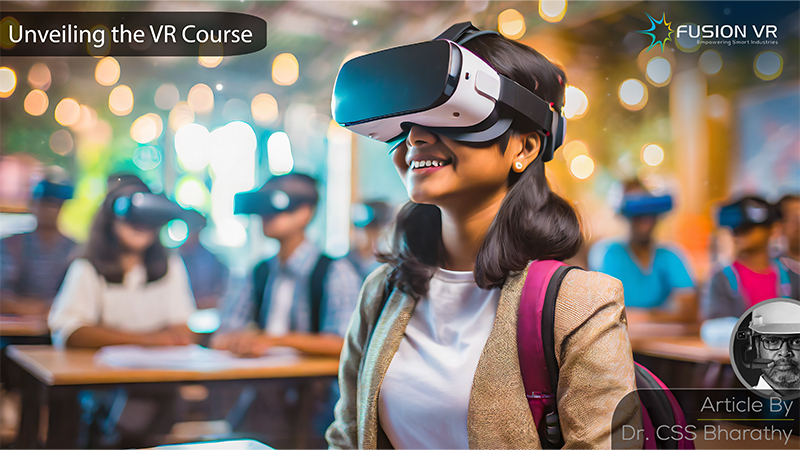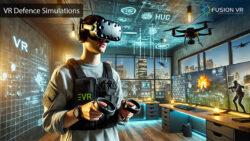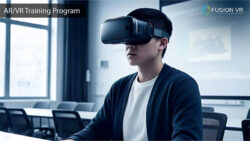A remarkable trend observed In recent years is a significant surge in the demand for virtual reality (VR) training courses. This trend has been observed across various fields and industries. We can attribute this trend to the advancements in the field of virtual reality technology and a better understanding of the benefits of this technology. The transformative effect of virtual reality in all kinds of experiences, be it in entertainment, education training, healthcare is very interesting. This is because of the completely immersive experiences that VR courses provide. Let us explore the trend of virtual reality courses gaining popularity in this blog so that we can participate in this trend and enjoy rewarding outcomes.
One of the first reasons for this trend is the technological advancements achieved in the field of virtual reality technology. The quality and capability of virtual reality headsets have grown tremendously. The gaming industry has been a pioneering force in the rapid development of VR technology. As the demand for virtual reality games shot up, so did the demand for headsets. This naturally resulted in headset manufacturers competing to provide the best headsets that delivered a higher quality gaming experience.
Along with high-quality headsets, other accessories such as motion controllers and haptic feedback devices also became more advanced and affordable. In a matter of a few years, VR transformed from a fringe technology to a mainstream one. For instance, leading companies like Oculus, now a part of Meta Platforms, formerly Facebook, have created VR headsets that provide a more high-quality immersive and interactive experience. These advancements enable users to engage in lifelike simulations, enhancing the effectiveness of training programs.
There is also a major change in workforce dynamics across all sectors. Virtual reality has been recognized as a game changer in the field of human performance. Various studies and reports have established that virtual reality is four times more effective than conventional training approaches. Today’s workforce is keenly aware of what they need to do to develop maximum competency in their chosen field. They have understood that most traditional approaches do not deliver the skills required for them to be successful. Many learning and development specialists in companies are recognizing this change and are motivated to introduce innovative training approaches that incorporate virtual reality. VR training courses are designed to deliver experiential learning that is highly retentive compared to traditional approaches.
VR Simulations and Training courses are delivering enhanced engagement and knowledge retention for its users. Walk into any school classroom or company training session, you will find many people at various levels of disengagement. The time, effort and cost expended in such learning experiences is huge and doesn’t deliver the intended value. The reduced retention rate leads to remedial training and more errors observed during work execution. Such errors at the workplace lead to excessive downtime and serious injuries to employees. Many have heard about the training simulators in the aviation industry that have helped develop skills and evaluate competencies for all pilots.
Another reason is that VR courses are actually cost-effective in the long run. It may appear that the initial investment in infrastructure and solutions may be higher compared to the investment in training manuals and trainers. However, the availability of a VR training set-up is practically 24 x 7. One must understand that VR simulators can be reused multiple times and replicated with multiple headsets. The training provided can be repetitive until the desired competencies are accomplished. Also, training can be provided for competencies through VR without using critical equipment in the plant or factory. Various scenarios can be developed to evaluate the depth of understanding of a trainee.
The demand we see is also fuelled largely by the manufacturing industry. This industry is very broad and is willing to invest in developing the solutions needed. They have been steadily identifying use cases that will be effective in addressing the pain points they face. The industry in general faces a crunch with skilled manpower and it is well known that it takes nearly six months to ensure employees are trained and certified to execute their assigned roles. Virtual reality training shortens this duration tremendously and saves a lot of time and money for employers. Many chemical companies are turning to virtual reality operator training simulators as it is usually hazardous to deliver the needed training inside a running refinery or chemical plant. This is also the trend in the healthcare sector, where doctors, surgeons and nurses are training on various procedures using virtual reality simulations. This provides the practice needed to perform these procedures without error and deliver positive patient outcomes. In the corporate world, we are using VR training for onboarding, leadership development, and soft skills training. Solutions create virtual scenarios that enable employees to practice interpersonal skills, conflict resolution, and decision-making. The immersiveness of VR training creates a real-world-like feeling during training making it more personal.
The COVID-19 pandemic upended many things for many people. The need to ensure global accessibility and remote learning has accelerated the adoption of virtual reality training. Overnight, all things physical turned virtual. Employees needed to actively contribute from the confines of their homes due to widespread lockdowns. This marked the rise of remote work and advances in global connectivity have made it possible to perform many activities from anywhere in the world. Virtual reality has now enabled learners to readily access virtual reality training content from anywhere in the world, with minimal latency issues.
The final reason for this trend is the psychological impact and emotional intelligence involved in training. The immersiveness of virtual reality training helps simulate realistic scenarios that challenge trainees on decision making that enhances their emotional intelligence. Delivering these skills is a challenge due to cost and logistical challenges.
While virtual reality (VR) training courses offer several advantages, it is important that we recognize and acknowledge the disadvantages and challenges with VR training courses and their adoption. Students and academics tend to ignore this as they learn virtual reality.
VR training comes with high initial costs. CEOs and CTOs must recognize that the investment in virtual reality courses comes with long-term benefits and make capital allocations accordingly. This is also true for the leadership of primary, secondary and tertiary institutions. Also, the availability of competent technical support to troubleshoot and restore training systems is critical. This boils down to making proper choices of VR solution providers such as Fusion VR. Another aspect of VR training is that prolonged use of headsets could lead to eye strain, motion sickness and general discomfort. .
A typical challenge appears when high-quality content needs to be created and embedded on VR training solutions. Many companies unlike Fusion VR may not have the breath of subject matter experts and advisory teams. We are closely in touch with industry leaders and academics to help them design the appropriate content for virtual reality training and vr development courses.
Fusion VR is a leader in the development of virtual reality training courses and simulations. We are also experts in developing courses that help students and young professionals grow into careers such as VR developers and engineers. Our most popular service is the Industry Academic Alliance Program IAAP. In this program, we have helped several leading institutions in India develop the AR VR infrastructure, labs and faculty to deliver the much needed talent to support the growing demand for VR AR engineers that is also fueled by the demand for Virtual Reality training. We offer a wide range of courses that offer major, minor, honors and VR certification programs at these institutions.
The future is virtual reality training and learning courses. There is great value in blending virtual reality courses with traditional learning approaches and delivering excellent learning experiences for all.





